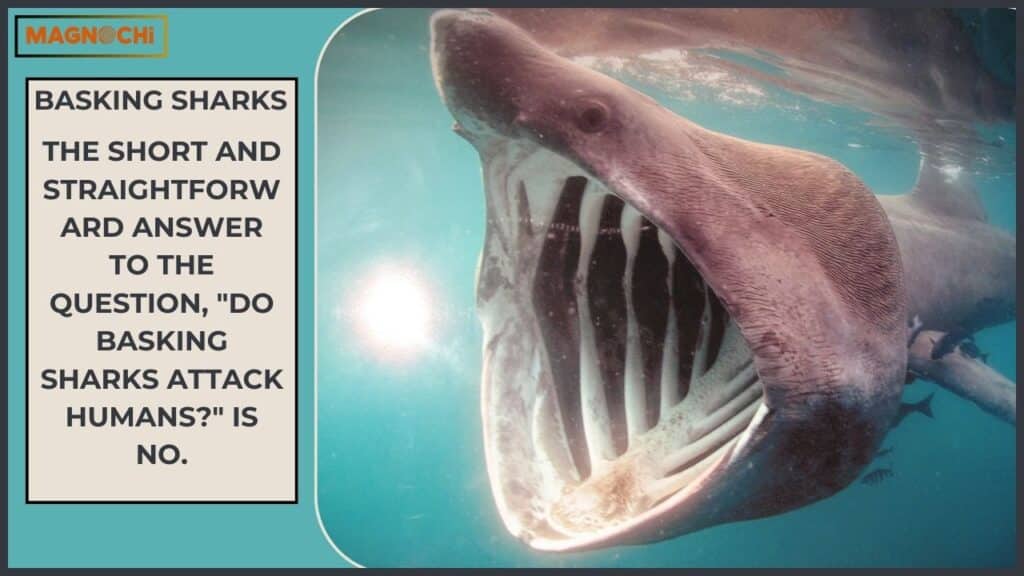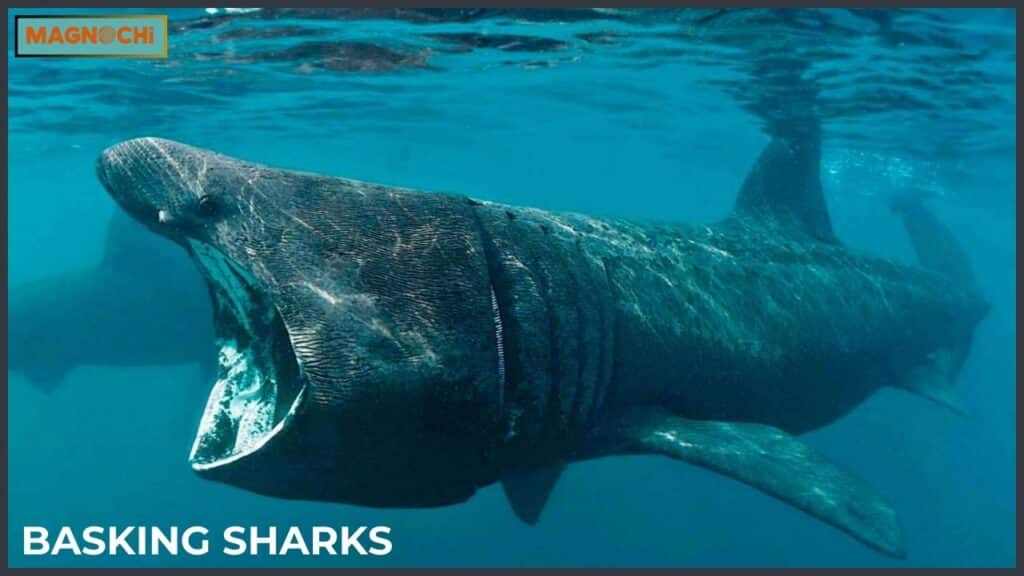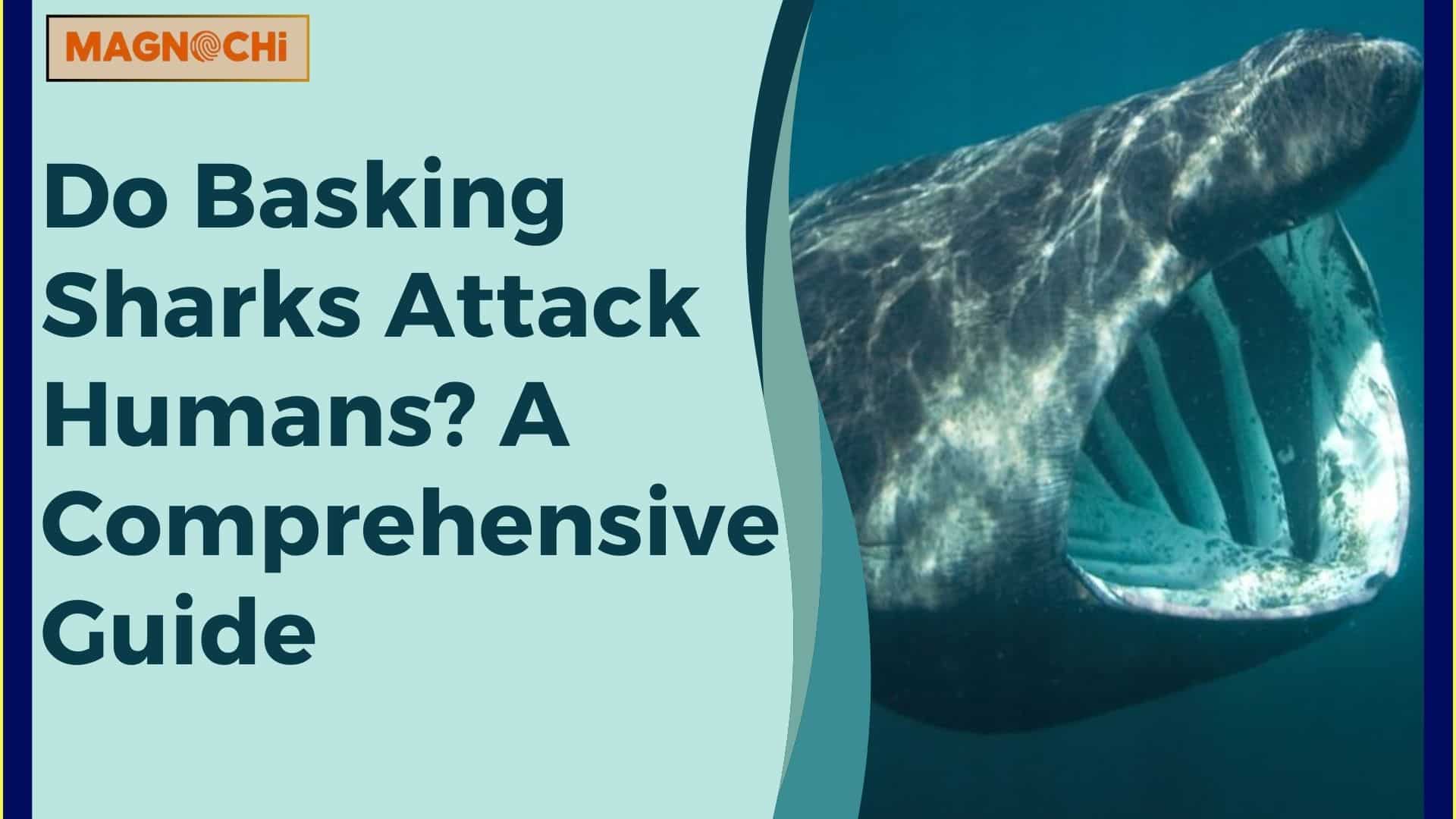Do Basking Sharks Attack Humans? Basking sharks, the gentle giants of the ocean, are often misunderstood. With their imposing size and unique feeding behavior, many people are curious about their interactions with humans.
Do basking sharks attack humans, or are they as harmless as they seem?
This in-depth article will explore everything you need to know about basking sharks, including their behavior, feeding habits, documented human interactions, and common myths.
We’ll also provide safety guidelines for those wishing to observe these magnificent creatures in the wild. [Do Basking Sharks Attack Humans?]
What Are Basking Sharks?
Basking sharks (Cetorhinus maximus) are among the largest shark species in the world, second only to the whale shark.
These filter feeders are often seen swimming slowly through coastal waters, with their massive mouths wide open to filter plankton from the water.
Despite their size, basking sharks are not predators and have a reputation for being non-aggressive. [Do Basking Sharks Attack Humans?]
Size and Appearance
Basking sharks are truly giant creatures. While they are not as large as whale sharks, which can grow up to 60 feet in length, basking sharks can reach lengths of up to 40 feet, with some reports suggesting they can grow even larger. These creatures are easily identifiable by their:
- Large, wide mouths: The most noticeable feature of a basking shark is its enormous mouth, which can measure up to three feet wide. This mouth is used to filter plankton and small fish from the water, rather than for capturing larger prey.
- Long, streamlined bodies: Basking sharks have a long, torpedo-shaped body, which helps them swim efficiently through water as they feed.
- Grayish-brown skin: They have a grayish-brown color with a slightly paler underside, which makes them difficult to spot in open water, except when they are feeding at the surface.
Teeth and Feeding Habits
Despite their intimidating appearance, basking sharks do not have the sharp teeth associated with predatory sharks. Instead, their teeth are tiny and not designed for grabbing prey.
Their primary means of feeding is by filter feeding – a technique in which they swim with their mouths wide open, allowing water and plankton to flow in.
These sharks are known to feed on plankton, small fish, and other microscopic organisms found in ocean waters. [Do Basking Sharks Attack Humans?]
Do Basking Sharks Attack Humans?
The short and straightforward answer to the question, “Do basking sharks attack humans?” is no. There have been no known or documented incidents where basking sharks have attacked or injured a human being.
While basking sharks are large and might appear intimidating due to their mouths opening wide while feeding, they are not dangerous to humans. [Do Basking Sharks Attack Humans?]

They pose no threat to divers, swimmers, or boaters. Their feeding behavior, which involves filtering plankton from the water, does not involve aggressive actions or predation on larger animals like humans.
Why Basking Sharks Don’t Attack Humans
There are several key reasons why basking sharks do not attack humans:
1. Diet and Feeding Habits
Basking sharks are filter feeders, meaning their diet consists primarily of plankton and small marine organisms, rather than larger prey like fish or seals. [Do Basking Sharks Attack Humans?]
Unlike great white sharks or bull sharks, which have sharp teeth designed to catch and eat larger prey, basking sharks simply filter plankton from the ocean using their open mouths.
The feeding method of basking sharks eliminates any potential for aggression or predatory behavior toward humans. [Do Basking Sharks Attack Humans?]
2. Non-Aggressive Behavior
Basking sharks are generally considered gentle giants. They are not predators, and their slow swimming patterns reflect their peaceful nature.
They often swim at a speed of about 1 to 2 miles per hour, which is a slow pace compared to other shark species that are known for their fast and aggressive hunting strategies.
Basking sharks are not territorial and do not exhibit the typical aggressive behaviors associated with other sharks. [Do Basking Sharks Attack Humans?]
3. Lack of Predatory Instincts
Unlike predatory sharks, basking sharks do not need to hunt other marine animals for survival. They rely on plankton and other microscopic organisms as their food source, which means they do not have the predatory instincts that other shark species have.
Great whites, for example, are known for their predatory behaviors, hunting large animals like seals. In contrast, basking sharks’ behavior is centered around their need to feed on small, non-threatening creatures like plankton. [Do Basking Sharks Attack Humans?]
4. Gentle Interaction with Humans
Basking sharks often swim near divers and humans without showing any signs of aggression. There have been countless encounters between basking sharks and humans, especially in places like the UK, Ireland, and the US, where these sharks are known to frequent coastal areas.
During these interactions, divers and swimmers report peaceful encounters, with the sharks often swimming alongside them without displaying any aggression. [Do Basking Sharks Attack Humans?]
Common Misconceptions About Basking Sharks
Basking sharks are often misunderstood due to their size and unique feeding habits. There are several common misconceptions about basking sharks that contribute to the fear surrounding them. Let’s take a closer look at these myths. [Do Basking Sharks Attack Humans?]
Myth 1: Basking Sharks Are Dangerous to Humans
One of the most persistent myths about basking sharks is that they are dangerous to humans. This misconception likely stems from the fact that basking sharks are large, and their mouths can appear threatening when they open wide to filter feed.
However, basking sharks are not aggressive and have never been involved in an attack on humans. Their primary food sources are small marine organisms, not large prey. [Do Basking Sharks Attack Humans?]
Myth 2: Basking Sharks Are Aggressive Predators
Another misconception is that basking sharks are aggressive predators that actively hunt other marine animals. This could not be further from the truth. [Do Basking Sharks Attack Humans?]
Unlike species like great whites, basking sharks do not hunt for food. They are filter feeders and rely on plankton and other microscopic creatures as their food source.
Myth 3: Basking Sharks Can Swallow Humans
Another popular but completely unfounded myth is that basking sharks can swallow humans due to their massive mouths.
However, this is simply not true. While basking sharks’ mouths may appear enormous, they are not capable of swallowing large objects, much less a human.
Their feeding mechanism is designed to filter small particles from the water, not to capture large prey. [Do Basking Sharks Attack Humans?]
Myth 4: Basking Sharks Are Just Like Other Sharks
Many people assume that all sharks are alike in terms of behavior and diet. However, basking sharks are very different from predatory species like bull sharks or great white sharks.
While these predators are capable of hunting and attacking, basking sharks are entirely non-aggressive and feed on plankton, not larger animals. [Do Basking Sharks Attack Humans?]
Documented Human Interactions with Basking Sharks
Although the thought of coming into contact with a shark might cause anxiety, encounters with basking sharks have been overwhelmingly peaceful. [Do Basking Sharks Attack Humans?]

Over the years, divers and eco-tourists have had numerous opportunities to observe basking sharks in their natural habitat, and these interactions have been safe and fascinating.
Basking Shark Sightings Around the World
Basking sharks can be found in temperate waters across the globe. They are most commonly spotted off the coastlines of the UK, Ireland, and the US, where they are known to visit in large numbers during the summer months to feed on abundant plankton.
- UK: The coastlines of Cornwall, Scotland, and Wales are well-known for basking shark sightings. In these areas, eco-tourism operators take tourists on boat trips to view these magnificent creatures in the wild.
- Ireland: The Atlantic coast of Ireland also sees its share of basking sharks, particularly around the west coast near the Aran Islands.
- US: The coastal waters of the US, particularly around California, are another hotspot for basking shark sightings.
Diver and Swimmer Encounters
Diving with basking sharks is a popular activity, and divers who have had the privilege of interacting with these sharks report no aggressive behavior.
These interactions are typically calm, with basking sharks swimming alongside divers without posing any danger. [Do Basking Sharks Attack Humans?]
In one remarkable instance off the coast of Scotland, a group of divers spent an entire afternoon swimming with basking sharks, with no sign of aggression from the sharks.
The experience left the divers in awe of the gentle giants of the sea. [Do Basking Sharks Attack Humans?]
Safety Tips for Observing Basking Sharks
Although basking sharks are non-aggressive, it is important to approach them with caution and respect. Following certain safety guidelines can ensure a positive and safe experience when observing these creatures in the wild. [Do Basking Sharks Attack Humans?]
Guidelines for Safe Shark Observation
- Keep your distance: Basking sharks are generally calm and non-aggressive, but it’s still important to maintain a safe distance. Avoid crowding or chasing the shark.
- Be calm and slow: Rapid movements can startle basking sharks, so approach them slowly and calmly.
- Avoid touching the shark: Although basking sharks are gentle giants, it’s important not to touch or disturb them. Respect their space to ensure their safety and your own.
- Listen to your guide: If you’re taking part in a tour or diving experience, always follow the guidance of your experienced guide or eco-tourism operator.
The Role of Basking Sharks in the Marine Ecosystem
Basking sharks play an important role in maintaining the health of marine ecosystems. As filter feeders, they help regulate plankton populations, which are an essential part of the oceanic food chain.
Plankton Control
By feeding on plankton, basking sharks help control their populations. Plankton forms the base of the marine food chain, providing food for larger fish, whales, and other marine life.
Without plankton feeders like basking sharks, the balance of marine ecosystems could be disrupted. [Do Basking Sharks Attack Humans?]
Contribution to Biodiversity
Basking sharks also contribute to marine biodiversity by maintaining a healthy balance of plankton and other small organisms. Their feeding behavior supports other marine creatures, and their presence in ecosystems is a sign of a well-functioning ocean.
Basking Sharks in Popular Culture
Basking sharks have not been featured as frequently in popular culture as their more aggressive counterparts like great whites, but they have been celebrated for their unique role in marine ecosystems.
Documentaries and Films
Basking sharks are often featured in marine documentaries that showcase the diversity of ocean life. These documentaries highlight the importance of protecting these non-aggressive creatures and their role in maintaining healthy oceans.
Final Verdict
Despite their enormous size and intimidating appearance, basking sharks are harmless to humans. These gentle giants are peaceful filter feeders, feeding primarily on plankton, and have never been known to attack humans.
Their role in the marine ecosystem is crucial, helping regulate plankton populations and maintaining a balance in the ocean’s food chain. [Do Basking Sharks Attack Humans?]
Rather than fear these non-aggressive creatures, we should appreciate their importance in marine biodiversity and work towards their protection.
By supporting conservation efforts and promoting responsible wildlife observation, we can ensure that basking sharks continue to thrive in our oceans for future generations to admire. [Do Basking Sharks Attack Humans?]
FAQs
Has the basking shark ever attacked humans?
No, basking sharks have never been known to attack humans. They are peaceful filter feeders and pose no threat to people. Their large mouths are designed to filter plankton, not to bite or harm. Interactions with humans are generally calm and non-aggressive.
Are basking sharks friendly to humans?
Yes, basking sharks are friendly and non-aggressive. They tend to swim peacefully near humans without displaying any threatening behavior. Divers and swimmers who encounter them often describe the experience as awe-inspiring, with no fear of attack.
Why can’t you touch a basking shark?
While basking sharks are harmless, it’s best not to touch them out of respect for their natural behavior. Touching may cause stress or disrupt their feeding. Maintaining a safe and respectful distance ensures both your safety and the shark’s well-being.
Can a human fit inside a basking shark?
No, a human cannot fit inside a basking shark. While they have large mouths, they feed only on plankton and small marine organisms. Their throats are not wide enough to swallow anything as large as a human, and they are non-predatory creatures.
What is the most aggressive shark?
The great white shark is often considered the most aggressive shark species. Known for its predatory behavior, it has been involved in more attacks on humans than other species. However, it’s important to note that great whites do not typically target humans as prey.
Can you pet a basking shark?
It’s not recommended to pet a basking shark. While they are gentle and non-aggressive, interacting with them in such a manner can cause stress. It’s best to admire these creatures from a safe distance and respect their natural environment.
Conclusion: Do Basking Sharks Attack Humans?
To sum up, basking sharks do not pose any threat to humans. These gentle giants of the sea are non-aggressive filter feeders that feed primarily on plankton and other microscopic organisms.
Despite their intimidating size and large mouths, basking sharks are peaceful creatures with no known incidents of attacking humans. [Do Basking Sharks Attack Humans?]
By understanding their behavior and debunking the myths surrounding them, we can appreciate these remarkable creatures and work toward their conservation.
For anyone fortunate enough to observe basking sharks in the wild, it’s an experience to cherish. They are not just non-threatening they are an essential part of the marine ecosystem and deserve our respect and protection.
So, the next time you encounter a basking shark, remember: these incredible creatures are gentle giants and should not be feared. [Do Basking Sharks Attack Humans?]









